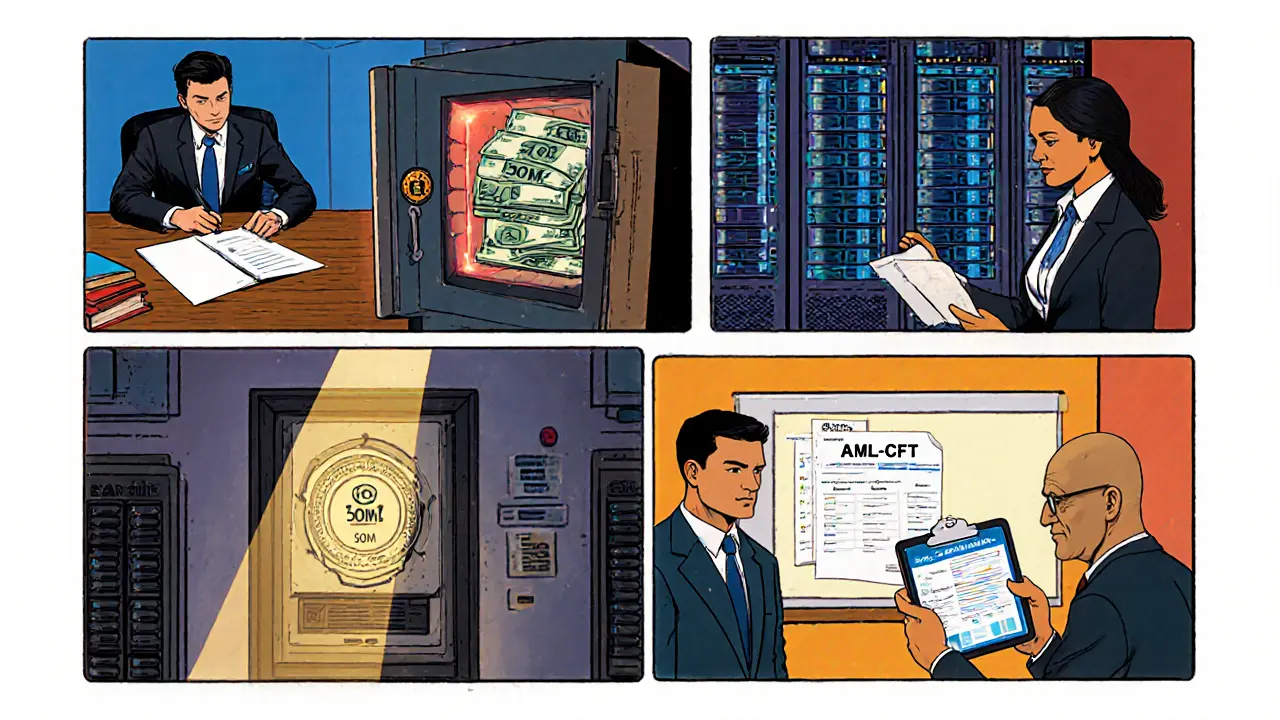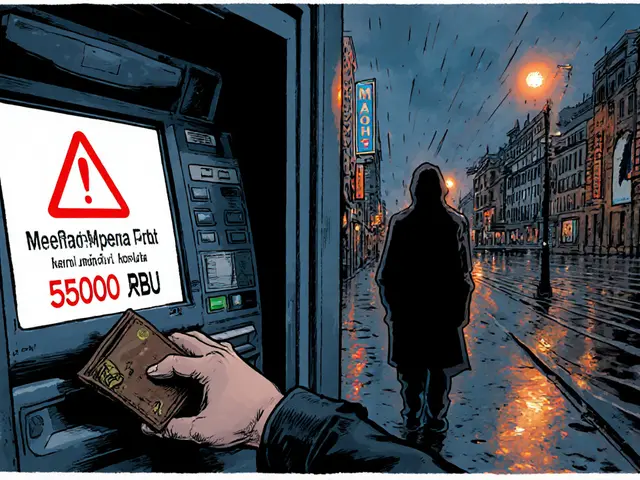Thai Crypto Exchange License: Complete Requirements & Step‑by‑Step Guide
Thai Crypto Exchange License Calculator
- Initial Capital Required: 50 million THB
- Application Fee: 2.5 million THB
- Average Processing Time: 150 days
- Ongoing Compliance Costs: Approx. 500,000 USD/year
Your Estimated Costs
Initial Capital Requirement: 50,000,000 THB
Application Fee: 2,500,000 THB
Annual Compliance Costs: 500,000 USD
Total Initial Outlay: 52,500,000 THB
Total 5-Year Cost: ~1,300,000 USD
* Note: These are estimates based on current regulations. Actual costs may vary.
Timeline Estimate
Processing Time: 150 days
Ongoing Compliance: Annually
Total Duration: 5 years
Key Requirements
- Thai registered company
- Physical office space
- At least 2 Thai nationals in executive roles
- AML-CFT compliance framework
- Cybersecurity measures
- Company Incorporation ✓
- Capital Deposit ✓
- AML Policy ✓
- Documentation ✓
- Submission to MoF ✓
Want to run a crypto exchange in Thailand? You’ll need to navigate a well‑defined, but hefty, licensing regime that balances rapid market growth with strict investor protection. Below you’ll find every major requirement, a realistic timeline, and a practical checklist that lets you move from idea to a fully‑licensed operator.
Key takeaways
- License is issued by the Ministry of Finance, supervised by the SEC.
- Three licensed business types: Digital Asset Exchange, Broker, Dealer.
- Initial capital: 50millionTHB (≈US$1.4M) plus a 2.5millionTHB application fee.
- Average processing time: 150days after complete submission.
- Ongoing AML‑CFT, KYC, cybersecurity and auditing obligations are mandatory.
Thai crypto exchange license is a regulatory permission that allows a company to operate a digital‑asset trading platform for Thai residents. The licence is granted under the Emergency Decree on Digital Asset Businesses B.E.2561 (2018) and the updated Royal Decree on the Operation of Digital Asset Businesses (No.2) B.E.2568 that took effect on 13April2025.
Regulatory landscape
The Thai framework rests on two pillars:
- Ministry of Finance (MoF) - primary licensing authority. It reviews company incorporation, capital deposits, and compliance documentation.
- Securities and Exchange Commission (SEC) - ongoing supervisory body. It enforces AML‑CFT rules, conducts inspections, and maintains the public licence register.
Both agencies publish licence status on the SEC website, giving users a clear way to verify legitimacy.
Licensed business categories
Thailand distinguishes three core categories. Each requires a separate licence and has its own compliance checklist.
| Category | Core Activity | Typical Users | Key Compliance Focus |
|---|---|---|---|
| Digital Asset Exchange | Order‑book matching of crypto‑to‑crypto and crypto‑to‑fiat pairs | Retail traders, institutional investors | Liquidity reporting, market surveillance, custodial safeguards |
| Digital Asset Broker | Facilitates over‑the‑counter (OTC) trades between counterparties | High‑net‑worth individuals, corporate clients | Enhanced KYC, transaction size monitoring |
| Digital Asset Dealer | Buys/sells digital assets for own account, no matching engine | Speculators, arbitrageurs | Capital adequacy, trade‑execution transparency |
Financial commitments
Licensing Thailand’s crypto market is capital‑intensive:
- Share capital: 50millionTHB (≈US$1.4M) must be deposited in a Thai‑registered bank before the licence can be issued.
- Application fee: 2.5millionTHB (≈US$70K) payable to the MoF on submission.
- Estimated total upfront outlay: ~52.5millionTHB (≈US$2.1M).
Beyond the cash requirement, expect legal, compliance and audit fees of at least US$500K before the licence is granted.

Step‑by‑step application process
- Company incorporation - Register a Thai Limited Company. Minimum 3 Thai shareholders (can include a foreign‑owned nominee structure) and a physical office.
- Capital deposit - Transfer the 50millionTHB share capital into a Thai bank account. Obtain a bank confirmation letter.
- Prepare compliance framework - Draft AML‑CFT policy, KYC procedures, cybersecurity standards, and internal audit plan. Use a recognised compliance software that logs all user verification steps.
- Compile documentation - Business plan, cash‑flow projections (3‑year), technical architecture diagram, team CVs, lease agreement, and the bank confirmation letter.
- Submit to Ministry of Finance - Pay the 2.5millionTHB fee, upload all documents via the e‑portal, and request a licence for the appropriate category.
- SEC review - The SEC conducts a risk‑based assessment, may request additional information, and schedules an on‑site inspection of your IT and AML controls.
- Licence issuance - If approved, the licence is published on the SEC’s official list. You must display the licence number on your website and all promotional material.
The whole cycle averages 150days, but delays are common if any document is missing or the AML policy is deemed insufficient.
Ongoing compliance obligations
Holding a licence is not a one‑off event; the SEC performs regular audits and imposes reporting duties:
- AML‑CFT - Quarterly transaction reports to the Anti‑Money Laundering Office (AMLO), real‑time sanctions screening, and periodic risk assessments.
- KYC - Identity verification using government‑issued ID, proof of address, and source‑of‑funds questionnaire for all users.
- Cybersecurity - Annual penetration testing, ISO‑27001‑aligned security controls, and a documented incident‑response plan.
- Financial reporting - Audited financial statements filed annually with the MoF, plus a monthly liquidity report for exchanges.
- Operational transparency - Public disclosure of fees, order‑book depth, and any conflicts of interest.
Practical checklist for aspiring operators
- Secure local legal counsel familiar with the 2018 Emergency Decree and 2025 Royal Decree.
- Establish a Thai‑registered entity and lease office space in Bangkok or ChiangMai.
- Open a corporate bank account; deposit 50millionTHB share capital.
- Select an AML‑CFT SaaS provider that supports Thai ID verification and sanctions lists.
- Develop a detailed technical architecture (matching engine, wallet infrastructure, API endpoints).
- Prepare a 3‑year financial model that shows breakeven within 24months.
- Draft internal audit and risk‑management policies; have them reviewed by a certified auditor.
- Submit the full dossier to the MoF and pay the application fee.
- Respond promptly to any SEC queries; schedule the on‑site inspection.
- After approval, publish the licence number, set up ongoing reporting calendars, and conduct quarterly compliance training.
Common pitfalls and how to avoid them
- Under‑estimating capital needs - Remember the 50millionTHB must sit in a Thai bank for the entire licence period; don’t treat it as a refundable deposit.
- Poor documentation - Missing lease agreements or incomplete CVs cause the 150‑day timeline to stretch to 200days.
- Inadequate AML policy - The SEC rejects any framework that lacks transaction monitoring thresholds or a clear escalation process.
- Foreign‑only teams - The law requires at least two Thai‑national executives; hiring local talent early prevents compliance gaps.
- Neglecting the sandbox - The SEC offers a sandbox for innovative products (e.g., DeFi wrappers). Participating can shorten approval for novel services.
Future regulatory outlook
Thailand’s crypto regime continues to evolve. The 2025 amendments opened the door for foreign platforms but also imposed stricter reporting on cross‑border data flows. Expect the SEC to release guidance on DeFi protocols and NFT marketplaces by late2025. Companies that embed flexibility-such as modular KYC engines and upgradeable smart‑contract wallets-will adapt more smoothly to upcoming rules.

Frequently Asked Questions
What is the minimum share capital required for a crypto exchange licence in Thailand?
The law mandates a paid‑up share capital of 50millionTHB (about US$1.4million) deposited in a Thai bank before the licence can be granted.
Which government body actually issues the licence?
The Ministry of Finance issues the licence; the SEC monitors compliance and can suspend or revoke the licence if rules are breached.
How long does the application process usually take?
If all documents are complete, the average processing time is around 150days from submission to final approval.
Can a foreign company run an exchange for Thai users?
Yes, but the 2025 Royal Decree requires the foreign operator to obtain a Thai licence and maintain a local legal entity, office, and Thai staff.
What ongoing reports must an exchange submit?
Monthly liquidity statements, quarterly AML transaction reports, and an annual audited financial statement are mandatory.






25 Comments
Sophie Sturdevant
March 18 2025The capital requirement alone makes this a serious hurdle.
Jan B.
March 23 2025I see the checklist is solid. The steps are clear. Good job on the summary.
MARLIN RIVERA
March 28 2025The guide tries to masquerade as a friendly roadmap but it’s riddled with unrealistic assumptions. First, the 50 million THB capital is presented as a mere deposit, ignoring the opportunity cost of locking up such funds. Second, the processing time of 150 days is a best‑case scenario that neglects bureaucratic inertia. Third, the compliance cost of $500 k per year assumes a perfectly efficient operation that most startups cannot achieve. Fourth, the requirement for two Thai nationals in executive roles often forces foreign founders into token appointments. Fifth, the AML‑CFT framework is described superficially, yet regulators demand granular transaction monitoring and real‑time sanctions screening. Sixth, the technical architecture expectations are vague, leaving engineers to guess at security standards. Seventh, the financial projections assume rapid user adoption without accounting for market volatility. Eighth, the licensing fees are listed in THB but the conversion to USD fluctuates, adding hidden exchange risk. Ninth, the guide glosses over the need for a dedicated legal team familiar with Thai securities law. Tenth, the sandbox opportunity is mentioned in passing, despite being a critical pathway for innovative products. Eleventh, the checklist does not address data residency concerns, which are becoming a regulatory focus. Twelfth, the lack of clarity on ongoing reporting cadence can lead to accidental non‑compliance. Thirteenth, the emphasis on physical office space ignores the trend toward virtual compliant setups. Fourteenth, the guide’s tone is overly optimistic, bordering on promotional rather than advisory. Finally, anyone relying on this guide without independent counsel is walking a legal tightrope.
emmanuel omari
April 2 2025Thailand’s crypto vision is bold, and foreign players should respect the local rules while contributing to national growth.
Andy Cox
April 8 2025Looks solid overall the cost breakdown is helpful but the timelines feel optimistic.
Sidharth Praveen
April 13 2025Even though the numbers seem steep, with proper planning you can lock in the license and tap into a booming market.
Richard Herman
April 18 2025Absolutely! 🎉 The key is to get that capital in the bank early and lock down a solid AML framework. Once that’s set, the rest falls into place. 🚀
Parker Dixon
April 23 2025Good point on the AML stuff. It’s the backbone of staying alive in the Thai market. 👍
Stefano Benny
April 29 2025Sure, the guide lists the fees, but in practice you’ll also pay hidden costs for third‑party integrations and API licensing. 🤷♂️
Bobby Ferew
May 4 2025Reading this made me feel a bit overwhelmed; the sheer amount of capital seems like a barrier that only big players can cross.
celester Johnson
May 9 2025The critique highlights systemic friction, yet the pursuit of compliance shapes market maturity. One must balance ambition with regulatory humility. Otherwise, the ecosystem risks stagnation.
Prince Chaudhary
May 14 2025Take the checklist step by step and don’t rush. Solid legal counsel and a local partner will smooth out most bumps.
John Kinh
May 20 2025Looks like another money‑grab guide. 🙄 Might work if you have deep pockets.
Mark Camden
May 25 2025While enthusiasm is commendable, it is crucial to allocate sufficient resources for ongoing audit and security assessments to avoid future penalties.
Evie View
May 30 2025This whole process is a cash‑sucking nightmare for startups.
Nathan Blades
June 4 2025Picture this: you’ve cleared the legal maze, your exchange is live, traders flood in, and you become a cornerstone of Thailand’s crypto future. It’s not a dream-it’s a grind, and every grind builds character.
Somesh Nikam
June 10 2025Stay focused on the AML policy, and don’t forget to document every step. It’ll save you headaches later. 😊
Debby Haime
June 15 2025Great summary! The cost table really helps visualize the financial commitment.
Courtney Winq-Microblading
June 20 2025In the grand tapestry of digital finance, Thailand’s framework is a thread weaving regulation with innovation, reminding us that order and freedom coexist.
katie littlewood
June 25 2025The guide does a commendable job laying out the procedural landscape, yet it occasionally trips over its own optimism. It starts strong with a crisp checklist, then meanders into dense legalese that could deter the uninitiated. While the capital requirement is explicit, the narrative could benefit from clearer analogies to illustrate cash flow impacts. Moreover, the mention of sandbox participation is tantalizing but underexplored, leaving readers yearning for deeper insight. On the bright side, the inclusion of a cost calculator adds tangible value. Still, a few more real‑world case studies would anchor the theoretical framework. Overall, it’s a solid foundation for aspiring exchangers. Keep iterating, and the guide will only get stronger.
Jenae Lawler
July 1 2025One must concede that the presented financial obligations, albeit substantial, are but a requisite substrate upon which the edifice of a compliant exchange shall be erected.
Chad Fraser
July 6 2025Yeah, get that Thai partner early and you’ll avoid a lot of headaches. Good luck! 🤞
Jayne McCann
July 11 2025I don’t think the license is worth the hassle.
Carl Robertson
July 16 2025Oh, the drama of watching hopeful founders stumble over bureaucratic red tape! It’s a tragic comedy.
Rajini N
July 22 2025Pro tip: keep a detailed spreadsheet of every document you submit and double‑check the Thai language translations. It saves repeated trips to the authority.